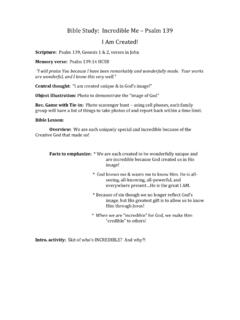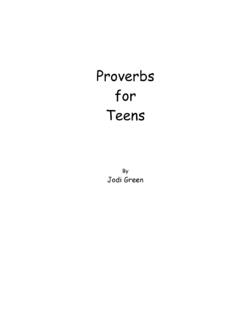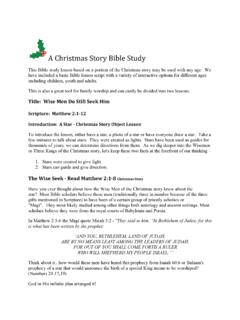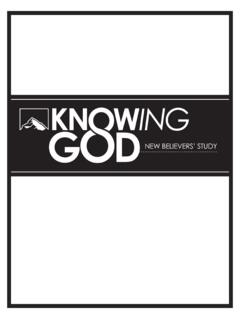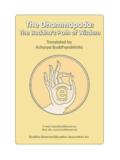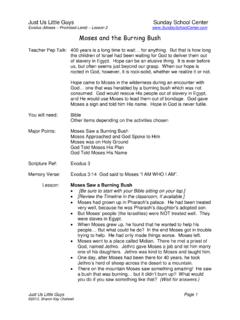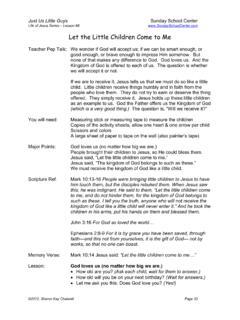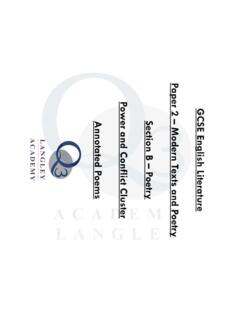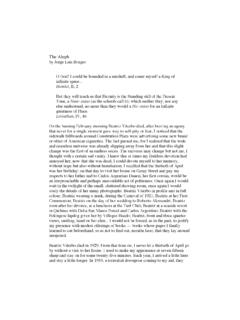Transcription of Old Testament 101 - CreativeBibleStudy.com
1 Old Testament 101 Daily Readings with study questions by Jodi Green 2 Copyright 2016 By Jodi Green All scripture quotations are from the New King James version. 3 Special Thanks A special thank you to Karissa Sherwin who journeyed with me through each lesson for two years, offering comments and suggestions along the way. You are a great blessing, Karissa! Also, special thanks to my brother, Jay Pettit For his wonderful advice and support throughout this project and my entire life. I love you! 4 5 How to Use This Book Old Testament 101 is a guide to studying the Old Testament in chronological order by reading one chapter per day, five days per week. This study is suitable for all ages, from middle school through adults. There is great benefit in studying the Bible in an orderly way, as opposed to a random passage each day or even a needs-based study (for example, helping you through a particularly difficult situation).
2 If you learn to study the Bible in a sequential way, you will eventually find what God's Word says about every conceivable human situation. In this study you will have five days of readings each week, reading usually one chapter per day. This leaves the weekends to catch up on anything that was missed during the week. This study is a comprehensive overview in which some books have representative chapters chosen for continuity, while others will be studied in their entirety. In other words, not every chapter of the Old Testament is included for specific study, but I would encourage you to read all of them if you can. In the cases of events repeated in different books, usually only one account is studied. Each lesson begins with an overview of the week's readings. Sometimes there are questions to consider in the overview that will help your general understanding of the lesson for that week.
3 You may skip the overview, but it can be very beneficial to your understanding of the chapters for the week. The questions are very straightforward and are designed to be answered in the simplest way. The primary goal is an understanding of God s Word rather than a specific application to your particular circumstances. Practice letting the Holy Spirit apply your day's reading as you meditate throughout the day on what His Word says. On the "For Further Study" pages, there is a selected key verse (s) to think about, and blank lines in which you may write a prayer, other passages that stand out to you, or some other aspect of the study that you may want to remember. 6 If you are confused by any of the passages that you read, there are many available resources for answering your questions. I would encourage everyone who wants to study the Bible to find a Bible-believing church and become involved.
4 The Holy Spirit is your best resource for understanding God s Word, but it is vital that your church leaders help you as well. There are many online helps, such as and others listed in the Study Helps section in the back. Finding a mentor to help you can also be of great benefit. May God bless you as you seek to know Him more through the study of His Word. In Christ, Jodi Green For the Word of God is living and powerful, and sharper than any two-edged sword, piercing even to the division of soul and spirit, and of joints and marrow, and is a discerner of the thoughts and intents of the heart. (Hebrews 4:12) 7 Lesson 1 Overview What a person believes about Genesis forms the basis for what he or she believes about everything. For example: do you really believe the Biblical account of creation, the entrance of sin and the flood?
5 Do you really believe Abraham s family is God s chosen people? As you read and study Genesis, you will have the opportunity to think about what you really believe about the Bible. Will you be among the majority and decide that only parts of the Bible are true? Will you pick out for yourself which parts are true and which parts are not? Will you trust modern scientists and social engineers over God s Word? Is the Bible really God s Word? Is it true? Or does science prove the Genesis account is incorrect? As you think about these questions, it would be of great benefit to spend some time in research about the claims of modern science concerning the origin of the universe and evolution. Some helpful places to begin are: ; ; So now, it s time to dig in to the first 5 chapters. These chapters make up so much of the basis of what to believe about the rest of the Bible that it will be helpful to spend at least two weeks reading and studying them.
6 Get in the habit of reading slowly and carefully. Think through exactly what God is telling you in each verse . There is so much controversy, even among Christians, over these beginnings. Answer the questions thoughtfully. Chapter 1 gives the creation overview, while chapter 2 fills in some greater detail. Chapter 3 shows the beginning of sin. If there are notes in your Bible, form the habit of cross-referencing. For example, Genesis does not give us the origin of the devil, but Ezekiel 28:11-19 explains a lot of what we know about him. 8 Lesson 1 Daily Bible Study Day 1: Read Genesis 1 How and when did God create light? (v. 1-5) _____What did God make on the second and third days? (v. 6-13) _____What did God make on the fourth and fifth days? (v. 14-23) _____What did God make on the sixth day? (v. 24-31) _____Beginning in verse 11, count the number of times the phrase, according to its kind (or the equivalent in your translation) is repeated: _____ What does this phrase mean?
7 _____ Day 2: Read Genesis 2 What did God do on the seventh day, and how did He describe it? (v. 1-3) _____How did man receive life? (v. 4-7) _____Where exactly was the garden? (v. 8-14) _____What restrictions and warnings did God give? (v. 15-17) _____How did God make the first woman and why? (v. 18-25) _____ Day 3: Read Genesis 3 9 What were the serpent s first words to the woman? (v. 1) _____How did she change God s words? (v. 2-3) _____Why did she eat the fruit? (v. 4-6) _____Why did they hide? (v. 7-13) _____What were the results? (v. 14-19) _____How did God clothe them and why? (v. 20-24) _____ Day 4: Read Genesis 4 What was the difference in the offerings? (v. 1-5) _____How did Cain respond? (v. 6-10) _____What was the result? (v. 11-16) _____Describe Cain s life and family. (v. 17-24) _____How was Seth s family different from Cain s?
8 (v. 25-26) _____ Day 5: Read Genesis 5 Why do you think these birth and death records are so precise? (v. 1-20) _____ What happened with Enoch and why? (v. 21-24) _____What was the relationship of Methuselah and Noah? (v. 25-32) _____ 10 For Further Study Key verse : In the beginning God created the heavens and the earth. Genesis 1:1 (This page is designed for you to write anything else that stood out to you in your Bible study or questions you may have. Also, writing out memory work is helpful. You may also use this space for sermon notes.) _____ 11 Lesson 2 Overview The story of Noah and the ark is one of the most popular stories in the entire Bible. In fact, almost every culture on our planet has a great flood story in its history, even the ones who do not know the Bible. So, are we meant to believe this story is real? That it actually happened?
9 Is there anything at all to suggest that the story is a parable or an allegory? How do we know if these people are real or imaginary? As you read and study the Bible, form the habit of letting the Bible explain itself to you. For example, to determine whether a story is real or a parable, find an example that you know is a parable, and see how it is introduced. Look up the Good Samaritan story (Luke 10:30-37). Does it seem to be told as a historical fact or as a parable? It should be clear that the Bible presents the account of the flood as a factual part of history. If you spend some time on the websites mentioned in Lesson 1, you will find a great amount of scientific evidence that shows the truth of this account. There are parts to this story that hold mystery for us. For example, in chapter 6, who exactly were the sons of God and the daughters of men?
10 Why were their children giants? Some scholars believe that the contrast was between Seth s descendants, who loved God, and Cain s descendants, who did not love God. The Bible doesn t tell us the answer. But we must develop the habit of trusting God to reveal to us what we need to know to understand His message of salvation to us. If there is something confusing, simply trust Him to show you what you need to know at the proper time. Just be sure you are getting all your facts from God s Word. These chapters are also a good place to spend a couple of weeks reading and rereading in order to gain a deeper understanding. 12 Lesson 2 Daily Bible Study Day 1: Read Genesis 6 What specifically grieved the Lord? (v. 1-6) _____What specific sins are mentioned? (v. 7-12) _____What shape was the ark? (v. 13-17) _____What did Noah do? (v.)
